By Robert St. Martin
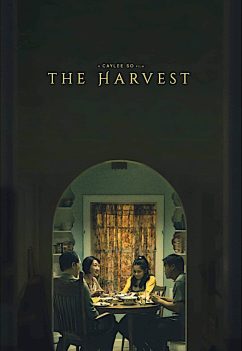 Los Angeles, CA (The Hollywood Times) 3/30/23 – Featured on Wednesday night as part of Outfest Fusion 2023 is “The Harvest,” a feature film a about a Hmong family in California written by Doua Moua and directed by Cayloo So. The screening was at the Tateuchi Democracy Forum Theatre of the Japanese American National Museum (JANM) in Little Tokyo in Los Angeles. As envisioned by Doua Moua, who is himself Hmong, the film is centered on the seemingly contentious relationship between a 27-year-old Hmong man and his ailing father who fled war-torn Laos in the 1970s and emigrated to the United States like many other Hmong refugees. Doua Moua has cast himself as the main character Thai, who has been living in the San Francisco area for seven years and returns home to see his family in Long Beach (in South California) at the insistence of his mother. She has become the main breadwinner of the family, since Doua’s father Cher (Perry Yung) is suffering from Stage 3 Renal Failure of his kidneys and is hoping for a kidney transplant. This heart-warming domestic drama attempts to show the burden of the past as reflected in the traditional cultural values of that the older generation of Hmong people, as they rub up against the more independent ideas of the younger generation living in America today.
Los Angeles, CA (The Hollywood Times) 3/30/23 – Featured on Wednesday night as part of Outfest Fusion 2023 is “The Harvest,” a feature film a about a Hmong family in California written by Doua Moua and directed by Cayloo So. The screening was at the Tateuchi Democracy Forum Theatre of the Japanese American National Museum (JANM) in Little Tokyo in Los Angeles. As envisioned by Doua Moua, who is himself Hmong, the film is centered on the seemingly contentious relationship between a 27-year-old Hmong man and his ailing father who fled war-torn Laos in the 1970s and emigrated to the United States like many other Hmong refugees. Doua Moua has cast himself as the main character Thai, who has been living in the San Francisco area for seven years and returns home to see his family in Long Beach (in South California) at the insistence of his mother. She has become the main breadwinner of the family, since Doua’s father Cher (Perry Yung) is suffering from Stage 3 Renal Failure of his kidneys and is hoping for a kidney transplant. This heart-warming domestic drama attempts to show the burden of the past as reflected in the traditional cultural values of that the older generation of Hmong people, as they rub up against the more independent ideas of the younger generation living in America today.
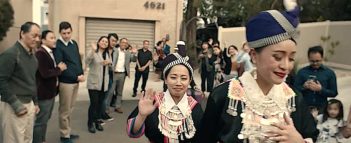 Obviously Duoa Moua drew on some of his own family’s experience, as he was born in Thailand to his Hmong parents, Cher Tong Moua and Pang Chang, after they fled Laos. After 6 months the family immigrated to the United States and, like many Hmong refugee families, Duoa grew up in Minnesota. The film entitled “The Harvest” is framed by images of the Hmong homeland in Laos where Duoa was born and where the main character Thai was born in the harvest season in Laos which is also the fire season, a time of destruction and death. The film opens with images of the mountain range on the southwestern border of Laos with Thailand near the Mekong River. We will later learn that for Duoa’s mother, it was a difficult birth and that the boy seemed to be born dead but was revived by the efforts of his father Cher. This theme comes full circle in the third act of this narrative film.
Obviously Duoa Moua drew on some of his own family’s experience, as he was born in Thailand to his Hmong parents, Cher Tong Moua and Pang Chang, after they fled Laos. After 6 months the family immigrated to the United States and, like many Hmong refugee families, Duoa grew up in Minnesota. The film entitled “The Harvest” is framed by images of the Hmong homeland in Laos where Duoa was born and where the main character Thai was born in the harvest season in Laos which is also the fire season, a time of destruction and death. The film opens with images of the mountain range on the southwestern border of Laos with Thailand near the Mekong River. We will later learn that for Duoa’s mother, it was a difficult birth and that the boy seemed to be born dead but was revived by the efforts of his father Cher. This theme comes full circle in the third act of this narrative film.
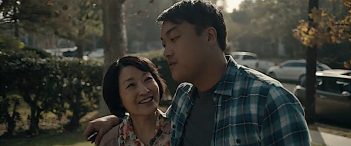 Duoa Moua originally envisioned a story about a Hmong father and son in the United States and their generational differences. But he fleshed out his story to include the son’s mother Youa (actress Dawn Ying Yuen) and, drawing on his own younger sister, to give Thai a feisty 17-year-old sister named Sue (played by Chrisna Chhor). After the framing flashback to the birth of Thai in the harvest season in Thailand, the story moves to the present and the fairly comfortable household of this seemingly middle-class family living in Long Beach. The father Cher, played by veteran actor Perry Yung) is not doing very well with his failing kidneys and is taken to a clinic for dialysis several times a week by his wife Youa.
Duoa Moua originally envisioned a story about a Hmong father and son in the United States and their generational differences. But he fleshed out his story to include the son’s mother Youa (actress Dawn Ying Yuen) and, drawing on his own younger sister, to give Thai a feisty 17-year-old sister named Sue (played by Chrisna Chhor). After the framing flashback to the birth of Thai in the harvest season in Thailand, the story moves to the present and the fairly comfortable household of this seemingly middle-class family living in Long Beach. The father Cher, played by veteran actor Perry Yung) is not doing very well with his failing kidneys and is taken to a clinic for dialysis several times a week by his wife Youa.
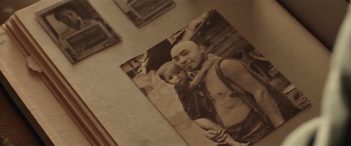 When Thai arrives home from San Francisco for a short visit, he is asked by his mother to help out and take his father Cher to dialysis because she is working two jobs to help keep the family financially afloat. She seems overwhelmed by the medical bills but manages to put on a cheerful front. Thai picks up his sister Sue at her high school where she is a bit miffed that he seems to be checking up on her and sees her boyfriend Chuck who happens to be African American. The screenplay hints at certain things about each of the characters but leaves us to realize that in Southeast Asian families, many things are not discussed in the open because the older cultural values predominate. Thai makes no mention of Sue’s boyfriend to his parents, and we are left to wonder what might have made him stay in San Francisco where he claims to be a writer and still unmarried at age 27. When he attends a pre-wedding party for a female Hmong friend, he seems uneasy when asked by some of his former school-age friends about his own marriage prospects.
When Thai arrives home from San Francisco for a short visit, he is asked by his mother to help out and take his father Cher to dialysis because she is working two jobs to help keep the family financially afloat. She seems overwhelmed by the medical bills but manages to put on a cheerful front. Thai picks up his sister Sue at her high school where she is a bit miffed that he seems to be checking up on her and sees her boyfriend Chuck who happens to be African American. The screenplay hints at certain things about each of the characters but leaves us to realize that in Southeast Asian families, many things are not discussed in the open because the older cultural values predominate. Thai makes no mention of Sue’s boyfriend to his parents, and we are left to wonder what might have made him stay in San Francisco where he claims to be a writer and still unmarried at age 27. When he attends a pre-wedding party for a female Hmong friend, he seems uneasy when asked by some of his former school-age friends about his own marriage prospects.
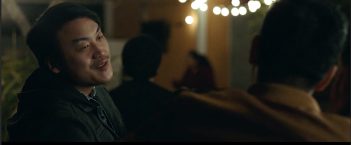 At the actual Hmong wedding in Long Beach, we see a tearful mother in traditional Hmong dress leading her daughter into the wedding ceremony – in a marriage that was obviously arranged by the families in the traditional Hmong way. The cultural belief in America of marrying a person with whom you are in love is not generally accepted by the older generation of Hmong people. The bride confides to Thai later that she figures that she will learn to love the man to whom she has been wedded. For the younger Hmong generation in the United States, the freedom to choose in life and love seems what they desire.
At the actual Hmong wedding in Long Beach, we see a tearful mother in traditional Hmong dress leading her daughter into the wedding ceremony – in a marriage that was obviously arranged by the families in the traditional Hmong way. The cultural belief in America of marrying a person with whom you are in love is not generally accepted by the older generation of Hmong people. The bride confides to Thai later that she figures that she will learn to love the man to whom she has been wedded. For the younger Hmong generation in the United States, the freedom to choose in life and love seems what they desire.
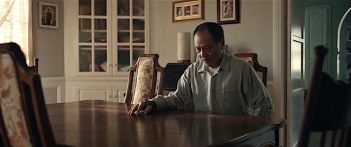 One might wonder why this film was selected to be in the line-up for Outfest Fusion, a LGBTQIA People of Color film festival. There is an undercurrent gay theme which is introduced at the wedding banquet, when a same-sex male couple congratulate the bride and Thai makes haste to avoid them. The older Hmong men seem taken aback that these two men were even invited to the wedding party. It certainly bristles Thai’s father Cher, but his sister Sue seems non-plussed about it – again, pointing to the generational differences and cultural attitudes. The screenplay by Duoa Moua attempts to bridge the gap between Thai and his very ill father, who is full of much rage against the world. Their little fishing trip to the seaside seems to warm up Cher a bit, but that quickly evaporates when he discovers that his wife and his daughter are doing things that are not under his patriarchal purview. A full-blown crisis of discovery on the part of the characters will send Cher to the emergency room of the hospital and a rapid chain of events that shape the third act of the story. Thai is given an opportunity to make a sacrifice for his family in a very special way.
One might wonder why this film was selected to be in the line-up for Outfest Fusion, a LGBTQIA People of Color film festival. There is an undercurrent gay theme which is introduced at the wedding banquet, when a same-sex male couple congratulate the bride and Thai makes haste to avoid them. The older Hmong men seem taken aback that these two men were even invited to the wedding party. It certainly bristles Thai’s father Cher, but his sister Sue seems non-plussed about it – again, pointing to the generational differences and cultural attitudes. The screenplay by Duoa Moua attempts to bridge the gap between Thai and his very ill father, who is full of much rage against the world. Their little fishing trip to the seaside seems to warm up Cher a bit, but that quickly evaporates when he discovers that his wife and his daughter are doing things that are not under his patriarchal purview. A full-blown crisis of discovery on the part of the characters will send Cher to the emergency room of the hospital and a rapid chain of events that shape the third act of the story. Thai is given an opportunity to make a sacrifice for his family in a very special way.
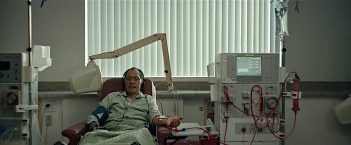 Cayloo So directed the film on a very tight schedule during the peak COVID years and, in the Q&A, she related that she needed to do research on Hmong customs and especially Hmong weddings in order to make the scenes culturally accurate. Her previous film “In the Life of Music” (2018) received a number of awards at the VC Asian Pacific International Film Festival in Los Angeles. Key to making the story unfold well was the strength of the cast and crew, most of whom were Southeast Asian and many Hmong themselves. Doua Moua is primarily an actor and was featured in “Grand Torino” (2008) and other films including “Mulan” (2020). He began writing the story for the film some years ago during a period of limited acting opportunities. Perry Yung is an American actor and musician from Oakland, CA. He is best known as Father Jun on Cinemax’s Bruce Lee drama “Warrior” produced by Justin Lin and as fan favorite Ping Wu on Steven Soderbergh’s “The Knick.” Perry has been a core member of La Mama Theater’s Great Jones Repertory Company of New York City since 1993.
Cayloo So directed the film on a very tight schedule during the peak COVID years and, in the Q&A, she related that she needed to do research on Hmong customs and especially Hmong weddings in order to make the scenes culturally accurate. Her previous film “In the Life of Music” (2018) received a number of awards at the VC Asian Pacific International Film Festival in Los Angeles. Key to making the story unfold well was the strength of the cast and crew, most of whom were Southeast Asian and many Hmong themselves. Doua Moua is primarily an actor and was featured in “Grand Torino” (2008) and other films including “Mulan” (2020). He began writing the story for the film some years ago during a period of limited acting opportunities. Perry Yung is an American actor and musician from Oakland, CA. He is best known as Father Jun on Cinemax’s Bruce Lee drama “Warrior” produced by Justin Lin and as fan favorite Ping Wu on Steven Soderbergh’s “The Knick.” Perry has been a core member of La Mama Theater’s Great Jones Repertory Company of New York City since 1993.




